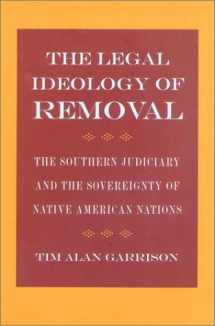
The Legal Ideology of Removal: The Southern Judiciary and the Sovereignty of Native American Nations
ISBN-13:
9780820322124
ISBN-10:
0820322121
Author:
Tim Alan Garrison
Publication date:
2002
Publisher:
University of Georgia Press
Format:
Hardcover
331 pages
Category:
Native American
,
Americas History
,
United States History
,
World History
FREE US shipping
Book details
ISBN-13:
9780820322124
ISBN-10:
0820322121
Author:
Tim Alan Garrison
Publication date:
2002
Publisher:
University of Georgia Press
Format:
Hardcover
331 pages
Category:
Native American
,
Americas History
,
United States History
,
World History
Summary
The Legal Ideology of Removal: The Southern Judiciary and the Sovereignty of Native American Nations (ISBN-13: 9780820322124 and ISBN-10: 0820322121), written by authors
Tim Alan Garrison, was published by University of Georgia Press in 2002.
With an overall rating of 3.8 stars, it's a notable title among other
Native American
(Americas History, United States History, World History) books. You can easily purchase or rent The Legal Ideology of Removal: The Southern Judiciary and the Sovereignty of Native American Nations (Hardcover) from BooksRun,
along with many other new and used
Native American
books
and textbooks.
And, if you're looking to sell your copy, our current buyback offer is $0.3.
Description
This study is the first to show how state courts enabled the mass expulsion of Native Americans from their southern homelands in the 1830s. Our understanding of that infamous period, argues Tim Alan Garrison, is too often molded around the towering personalities of the Indian removal debate, including President Andrew Jackson, Cherokee leader John Ross, and United States Supreme Court Justice John Marshall. This common view minimizes the impact on Indian sovereignty of some little-known legal cases at the state level.Because the federal government upheld Native American self-dominion, southerners bent on expropriating Indian land sought a legal toehold through state supreme court decisions. As Garrison discusses Georgia v. Tassels (1830), Caldwell v. Alabama (1831), Tennessee v. Forman (1835), and other cases, he shows how proremoval partisans exploited regional sympathies. By casting removal as a states' rights, rather than a moral, issue, they won the wide support of a land-hungry southern populace. The disastrous consequences to Cherokees, Creeks, Choctaws, Chickasaws, and Seminoles are still unfolding.Important in its own right, jurisprudence on Indian matters in the antebellum South also complements the legal corpus on slavery. Readers will gain a broader perspective on the racial views of the southern legal elite, and on the logical inconsistencies of southern law and politics in the conceptual period of the anti-Indian and proslavery ideologies.


We would LOVE it if you could help us and other readers by reviewing the book
Book review

Congratulations! We have received your book review.
{user}
{createdAt}
by {truncated_author}


